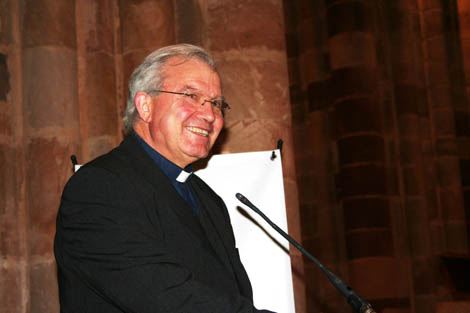 The Bishop of Algarve called for a Europe with "soul" and "values", different from the one that "is being built", which only "sees the financial side" and the "profit for profit" that "enslaves" and "dehumanizes" ”.
The Bishop of Algarve called for a Europe with "soul" and "values", different from the one that "is being built", which only "sees the financial side" and the "profit for profit" that "enslaves" and "dehumanizes" ”.
"A Europe built by inhabitants who lose the feeling of 'seeing' with the heart can be a Europe that sees only the financial and economic side, profit for profit, in which the economy is not at the service of the person", said D. Manuel Neto Quintas on Thursday, May 9, Europe Day, during a prayer vigil of the “Together for Europe” movement, which brought together Catholic, Evangelical, Anglican and Orthodox Christians.
The prelate called for unity in “building a different and better Europe”, “united, solidary and welcoming”, where living is “a sign of freedom, justice and solidarity”.
In a meeting that brought together around 200 people, the bishop of the Algarve pointed out the need to build a Europe open “with generosity, to the challenges of the poor world, a Europe that puts the desire for peace and coexistence at the center of its concerns and its Work".
Giving Europe a Christian soul was at the origin of a meeting that brought together Christians from various Churches in prayer, organized by the movement «Together for Europe» which aims to help “rekindle the Christian soul” of the continent, bringing together “talents and charisms” from different movements and ecclesial communities and from various Christian Churches, he explained. António Aparício, one of the organizers of the initiative, according to the Folha do Domingo newspaper.
The vigil was also concelebrated by Father Firmino Ferro, Vicar General of the Algarve Catholic Church, by Father Ioan Rîşnoveanu, representative of the Algarve's Romanian Orthodox Church, and by Father Oleg Trushko, representative of the Greek-Catholic Church in the Algarve.
Responding to the appeal of John Paul II on the eve of Pentecost in 1998, founders and leaders of various movements began a journey of communion, of mutual knowledge among all, this path being later extended to other Christian Churches, initiating a collaboration to “fill in the huge religious void in Europe”.
This movement is based on the 7 YES' manifesto which underlines in seven points the desire to contribute to a united Europe, despite the differences, in an effective collaboration between the movements and open to all people.
The '7 YESs' proposed are the “YES to life, defending it in all its stages”, the “YES to the family, the root of a society open to the future”, the “YES to creation, defending nature and the environment”, the “YES to a just economy, at the service of the person and humanity”, the “YES to solidarity with the poor and marginalized”, the “YES to peace, promoting reconciliation through dialogue” and the “ YES to fraternal responsibility”, so that cities “become spaces and welcoming”.
















Comments